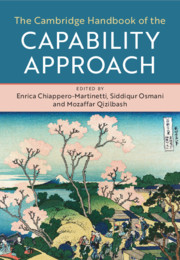Book contents
- The Cambridge Handbook of the Capability Approach
- The Cambridge Handbook of the Capability Approach
- Copyright page
- Dedication
- Contents
- Figures
- Tables
- Contributors
- Foreword
- Acknowledgements
- General Introduction
- Part I Historical Antecedents and Philosophical Debates
- Part II Methods, Measurement and Empirical Evidence
- Introduction to Part II
- 13 Social Choice and the Capability Approach
- 14 On Capability and its Measurement
- 15 Analyzing Capabilities
- 16 Implementing the Capability Approach with Respect for Individual Valuations
- 17 Capability, Opportunity, Outcome and Equality
- 18 The Distribution of Capabilities
- 19 Inter-Group Disparities in the Distribution of Human Development
- 20 Multidimensional Inequality and Human Development
- 21 The Research Agenda on Multidimensional Poverty Measurement
- 22 Measuring Gender Inequality Using the Capability Approach
- 23 Econometric and Statistical Models for Operationalizing the Capability Approach
- 24 Expanding Capabilities through Participatory Action Research
- Part III Issues in Public Policy
- Index
- References
23 - Econometric and Statistical Models for Operationalizing the Capability Approach
from Part II - Methods, Measurement and Empirical Evidence
Published online by Cambridge University Press: 11 November 2020
- The Cambridge Handbook of the Capability Approach
- The Cambridge Handbook of the Capability Approach
- Copyright page
- Dedication
- Contents
- Figures
- Tables
- Contributors
- Foreword
- Acknowledgements
- General Introduction
- Part I Historical Antecedents and Philosophical Debates
- Part II Methods, Measurement and Empirical Evidence
- Introduction to Part II
- 13 Social Choice and the Capability Approach
- 14 On Capability and its Measurement
- 15 Analyzing Capabilities
- 16 Implementing the Capability Approach with Respect for Individual Valuations
- 17 Capability, Opportunity, Outcome and Equality
- 18 The Distribution of Capabilities
- 19 Inter-Group Disparities in the Distribution of Human Development
- 20 Multidimensional Inequality and Human Development
- 21 The Research Agenda on Multidimensional Poverty Measurement
- 22 Measuring Gender Inequality Using the Capability Approach
- 23 Econometric and Statistical Models for Operationalizing the Capability Approach
- 24 Expanding Capabilities through Participatory Action Research
- Part III Issues in Public Policy
- Index
- References
Summary
This chapter provides an overview of econometric and statistical methodologies that have been proposed in the literature for operationalizing the capability approach. It covers descriptive as well as modelling approaches, the former focusing on developing a full picture of the well-being situation using many indicators, and the latter going further to determine possible ‘causes’ for the situation, and hence leading to potential actions for improvement. It also highlights how the capability or freedom aspect is modelled using latent variables in the explanatory frameworks. Finally, it mentions some promising directions for future research in this domain and suggests combining the different approaches to obtain an optimal well-being output integrating both the descriptive and explanatory properties and allowing for informed policy decisions.
Keywords
Information
- Type
- Chapter
- Information
- The Cambridge Handbook of the Capability Approach , pp. 453 - 476Publisher: Cambridge University PressPrint publication year: 2020
